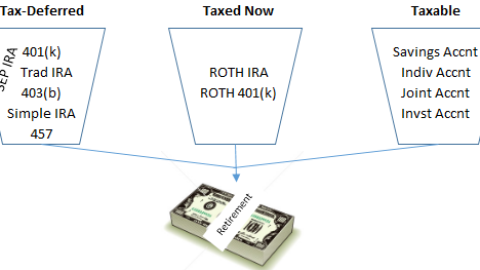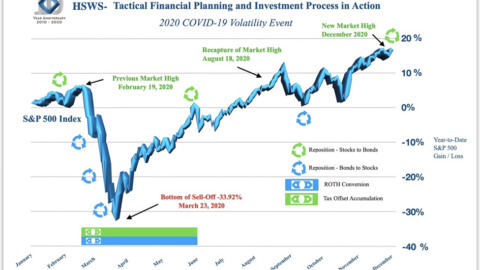Q3 2016 Market Update
By Steven Higgins, Financial Advisor, Principal
What A Difference A Year Makes
 The third quarter of 2016 saw U.S. stocks as measured by the S&P 500 rise 3.85%.* Most of the gains came in the first part of July as stocks regained footing from the “Brexit” ordeal. By the end of the quarter, the British referendum to leave the European Union is but a faint memory. August had arguably the lowest level of volatility since 1970: 17 straight days had less than a 0.75% move in any direction and the index tracking volatility, VIX, touched a two year low in early August. In contrast, August of 2015 was quite a ride. The S&P 500 experienced six consecutive down days of 1% with two days seeing 2% drops (CNN Money). The worst day of August 2015 saw the S&P 500 down 1,000 points during the trading session. The volatility a year ago scared a lot of investors out of the market. However, the S&P 500 has risen 13.95% since the low on August 24, 2015, which is almost 3 times the average annual return for the index over the past 10 years.*
The third quarter of 2016 saw U.S. stocks as measured by the S&P 500 rise 3.85%.* Most of the gains came in the first part of July as stocks regained footing from the “Brexit” ordeal. By the end of the quarter, the British referendum to leave the European Union is but a faint memory. August had arguably the lowest level of volatility since 1970: 17 straight days had less than a 0.75% move in any direction and the index tracking volatility, VIX, touched a two year low in early August. In contrast, August of 2015 was quite a ride. The S&P 500 experienced six consecutive down days of 1% with two days seeing 2% drops (CNN Money). The worst day of August 2015 saw the S&P 500 down 1,000 points during the trading session. The volatility a year ago scared a lot of investors out of the market. However, the S&P 500 has risen 13.95% since the low on August 24, 2015, which is almost 3 times the average annual return for the index over the past 10 years.*
Top Google Search: What is Brexit?
 In the hours after the polls closed in the UK, the top Google search in the country was, “What is Brexit?” Followed by, “What is the European Union?” The article posted by NPR highlighted the intense environment in which British subjects frustrated with European Union policy jammed the polls and surprised the world by voting to give Parliament the authority to begin the process of leaving the European Union. Needless to say, the markets were caught off guard by the vote which defied previous polling. U.S. and European markets dropped by 7-10% over two trading days. Within a week most of the stock indexes had already recaptured what was lost and for the remainder of the summer European stocks held steady. The French Index (CAC) is down 3.3% YTD, the German Index (DAX) is down 2.1% YTD, and the UK index (FTSE) is up 10% YTD.
In the hours after the polls closed in the UK, the top Google search in the country was, “What is Brexit?” Followed by, “What is the European Union?” The article posted by NPR highlighted the intense environment in which British subjects frustrated with European Union policy jammed the polls and surprised the world by voting to give Parliament the authority to begin the process of leaving the European Union. Needless to say, the markets were caught off guard by the vote which defied previous polling. U.S. and European markets dropped by 7-10% over two trading days. Within a week most of the stock indexes had already recaptured what was lost and for the remainder of the summer European stocks held steady. The French Index (CAC) is down 3.3% YTD, the German Index (DAX) is down 2.1% YTD, and the UK index (FTSE) is up 10% YTD.
The Home Stretch: What to Expect Going Forward
The election, quarterly earnings, and interest rates will drive the market discussion over the next few weeks and months.
- The more predictable the outcome of the election, the less impact the election will have on the market. If polling is close, expect more volatility.
- U.S. company quarterly earnings have been lower for three consecutive quarters; however, they have steadily improved. This may be the quarter where the combination of lowered expectations and growing earnings create an environment where companies show they are in better shape than we thought.
- The markets have certainly priced in interest rate increases to an extent. Regardless of whether the Federal Reserve increases the Fed Funds rate at the December meeting, the market will go through a period of adjustment as it reestablishes expectations. Our view is that the Fed will be limited in what it can do as intermediate and long term rates are controlled by supply and demand and global demand for U.S. bonds is immense. While rates will likely have an upward trend over time, we are unlikely to see a dramatic widespread increase across the yield curve. We maintain a bias toward short term bonds.
In November we will witness the welcomed conclusion of what has to be one of the most odd presidential elections. As much as the economy is the subject of the election, history tells us that the party of the elected president has less affect on economic outcomes than the candidates would suggest. The markets prefer predictability and stability. The financial markets are inherently learning mechanisms capable of translating data into valuations. What causes markets to stumble are instances where there is not enough data to assign a value to a given asset. What is important to understand is that political rhetoric aside we all have very much aligned interests and goals. We want what is best for our families. After the spectacle of the election fades and a new president is sworn in, you will still have goals to meet and there will be work to do. We will certainly be focused on our client’s long term goals.
—
The S&P 500 is an unmanaged index of 500 widely held stocks that is generally considered representative of the U.S. stock market. VIX is the Chicago Board Options Exchange (CBOE) Volatility Index, which shows the market’s expectation of 30-day volatility. It is constructed using the implied volatilities of a wide range of S&P 500 index options. It is a widely used measure of market risk. The CAC 40 is a benchmark French stock market index. The index represents a capitalization-weighted measure of the 40 most significant values among the 100 highest market caps on the Euronext Paris. The DAX is a blue chip stock market index consisting of the 30 major German companies trading on the Frankfurt Stock Exchange. The Financial Times Stock Exchange 100 Index, also called the FTSE, is a share index of the 100 companies listed on the London Stock Exchange with the highest market capitalization. Inclusion of these indexes is for illustrative purposes only. Keep in mind that individuals cannot invest directly in any index, and index performance does not include transaction costs or other fees, which will affect actual investment performance. Individual investor’s results will vary. Past performance does not guarantee future results. International investing involves additional risks such as currency fluctuations, differing financial and accounting standards, and possibly political and economic instability. Also, investing in emerging markets can be riskier than investing in well-established foreign markets. There is no assurance any of the trends mentioned will continue in the future. Investing involves risk and investors may incur a profit or a loss, including the loss of all principal. Views expressed in this newsletter are the current opinion of the author and are subject to change without notice. Information contained in this report was received from sources believed to be reliable, but accuracy is not guaranteed. Opinions expressed are not necessarily those of Raymond James.
*Financial data: Yahoo Finance









